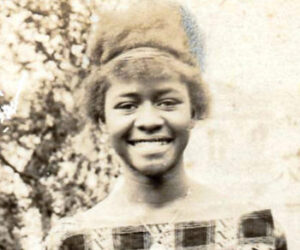
Jeanne Nardal
*Jeanne "Jane" Nardal was born on this date in 1902. She was an Afro Caribbean writer, philosopher, teacher, and political commentator.
Jane Nardal was from Martinique, West Indies, the fourth of seven daughters (Paulette, Emilie, Alice, Lucy, Cécile, Andrée) born to Paul Nardal, a black engineer, and Louise Achille, a métisse (mixed) schoolteacher, musician, and organizer. Her parents instilled in their daughters a commitment to education and the arts. All their children would grow up to become successful, well-educated women. After completing her preparatory school education, Nardal joined her sister Paulette in Paris in 1923 to study classic literature and French at the Sorbonne.
Throughout their time in Paris, Paulette and Jane kept a Sunday literary salon where young Black intellectuals, including Léopold Senghor, Aimé Césaire, and Damas, as well as African American and West Indian scholars, met. This was to exchange theories and build a foundation for a budding race consciousness that would be influential throughout the Black diaspora. Her sister was a point of contact between French-speaking Caribbean and African intellectuals and African American scholars and musicians. In February 1928, she was a founding member of La Dépêche africaine, the official bimonthly newspaper of the Comité de défense des intérêts de la race noire (Committee for the Defense of the Interests of the Black Race).
She wrote two critical essays for the paper, including "Internationalism Noir" (Black Internationalism), published in the journal's first issue. In her writings, Jane also outlined pivotal concepts central to the early Negritude movement, including the global community, Afro-Latin race consciousness, the New French-speaking Negro, and the après-guerre nègre. Nadal moved back to Martinique in 1929, where she hosted a conference on "Le chant Nègre aux Etats-Unis" (Black songs in the United States) focusing on the influence of Blues.
Nadal pursued a successful music career as a classics teacher, teaching in Martinique and, for two years, in Chad. She married Jules Joseph Zamia, a Guadeloupean doctor, in 1931. She and her sister, Paulette Nardal, laid the theoretical and philosophical groundwork for the Négritude movement. "Négritude" itself was coined by Martinique writer-activist Aimé Césaire, one of the three individuals formally recognized as the "fathers" of the cultural movement, along with Senegalese poet Léopold Senghor and French Guianese writer Léon Damas. It was not until relatively recently, however, that the women involved in the Négritude movement, including Jane and Paulette Nardal, began to receive the recognition they were due.
Nardal got into trouble when she tried to enter politics. In 1956, someone threw a torch through the window of the Nardal family home, burning many of Paulette's correspondence and writings in response to Jane's political activity. Her family forbade Jane from continuing her involvement in politics. Four years later, she began to go blind and eventually pulled away from public life. She died on November 19, 1993.